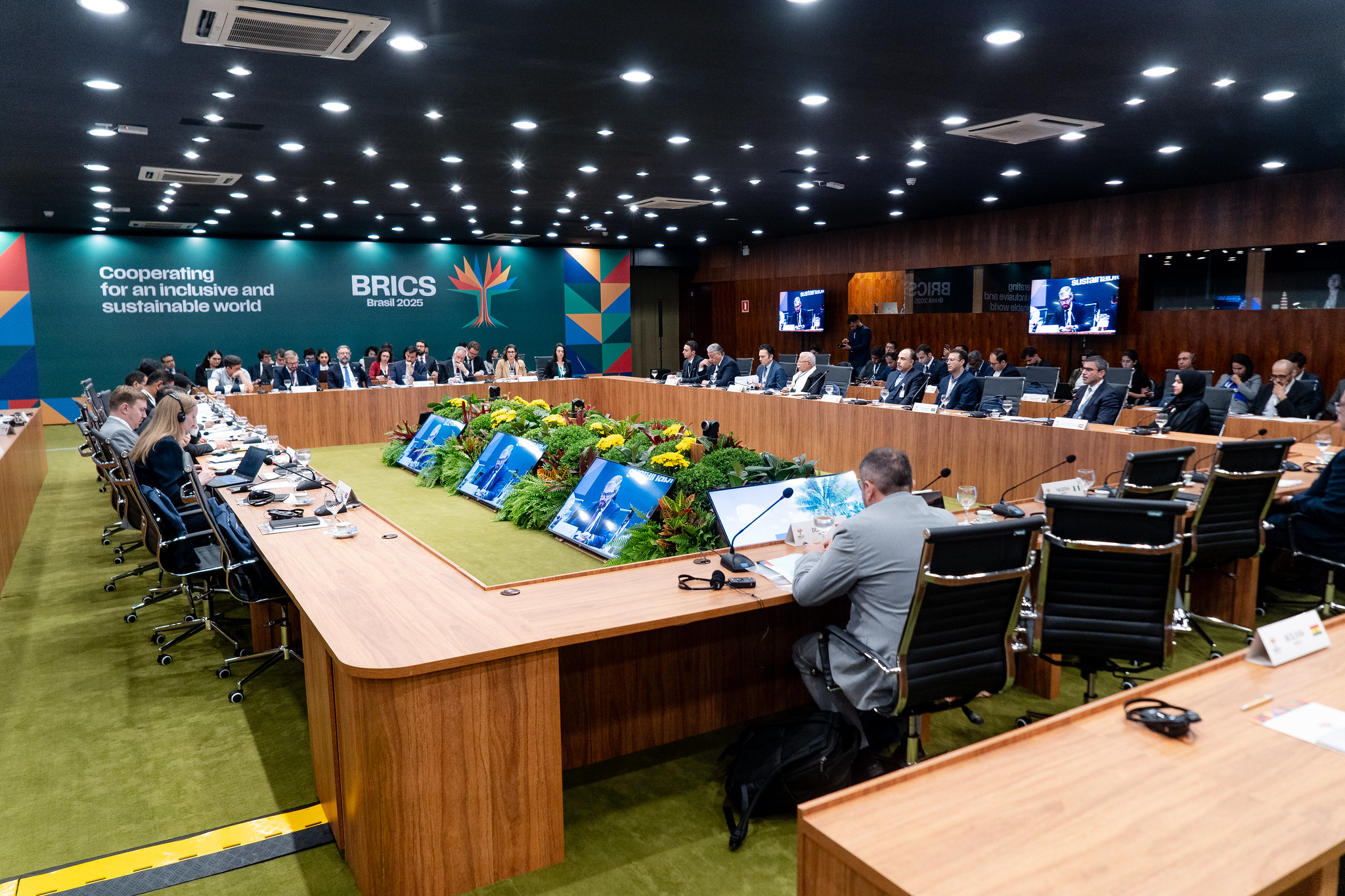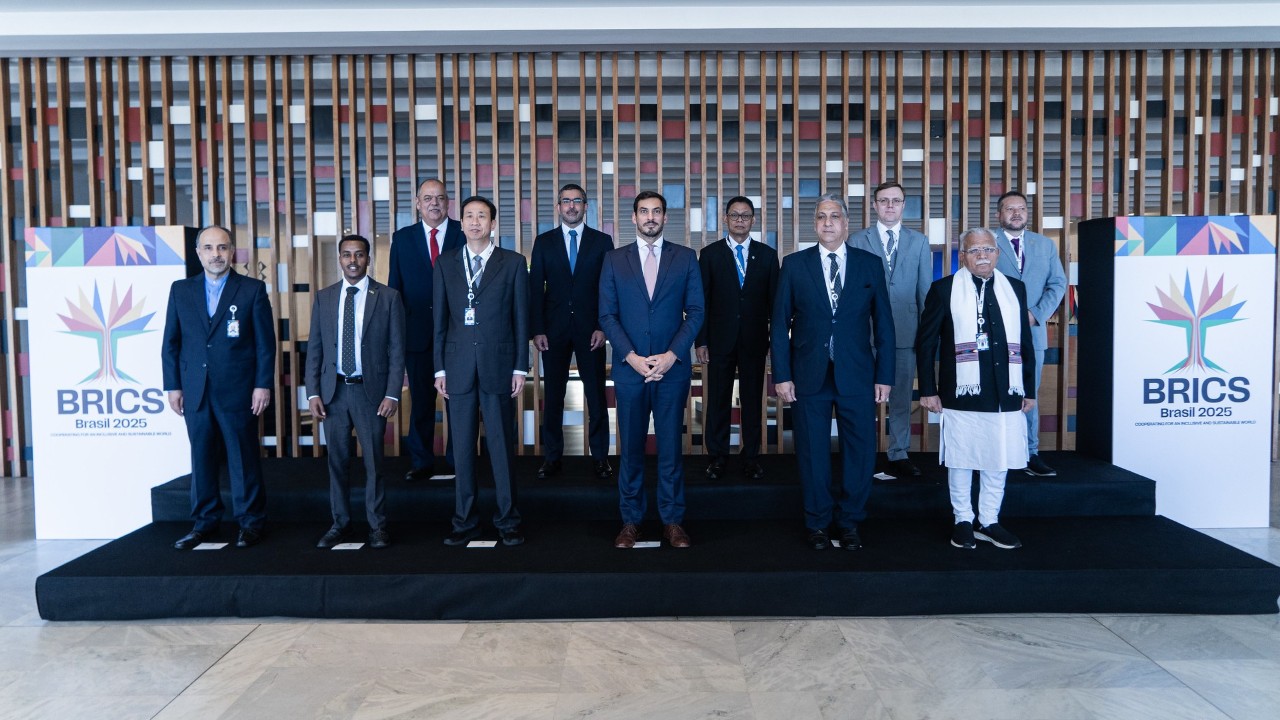Commitment to a just and financially feasible energy transition marks BRICS Joint Energy Statement
Energy Ministers from BRICS member states convened to discuss aligning global competitiveness with the decarbonization of strategic sectors. Key outcomes include the adoption of the BRICS Energy Cooperation Roadmap 2025–2030

Por Franciéli Barcellos de Moraes / francieli.moraes@presidencia.gov.br
On Monday (19), through a Joint Statement endorsed by the Energy Ministers of BRICS countries, the group reaffirmed its commitment to just, orderly, and inclusive energy transitions. The 28-paragraph document underscores the importance of reducing greenhouse gas emissions in line with the Paris Agreement and the Sustainable Development Goals (SDGs), while respecting national contexts and priorities. Bolivia and Cuba, as partner countries, also participated in the meeting held at the Itamaraty Palace in Brasília.
"The world increasingly sees the energy transition not only as a necessity in the face of climate change but as an opportunity to reposition our countries within a new economic paradigm for the benefit and prosperity of all peoples"
By aligning regulatory frameworks and attracting investments, member countries aim to enhance global competitiveness and accelerate the decarbonization of key sectors such as transport and industry. In this context, the statement advocates for more open and equitable international energy markets, including the use of local currencies in energy trade and improved access to low-interest financing.
"Energy is a strategic pillar of our economies and societies. Together, we account for nearly 50% of global energy production and consumption. This places a shared responsibility on us to strike a balance between energy security, sustainable development, and the transition to a low-carbon future," stated Thiago Barral, National Secretary for Energy Transition and Planning at Brasil’s Ministry of Mines and Energy (MME). He further emphasized that without adequate investment, the transition will be slower, less equitable, and less inclusive.
Echoing this perspective, Ambassador Mauricio Lyrio, BRICS Sherpa and Secretary for Climate, Energy, and Environment at the Ministry of Foreign Affairs, asserted that energy security and a just transition are not at odds with economic development but are, rather, complementary. “The world increasingly sees the energy transition not only as a necessity in the face of climate change but as an opportunity to reposition our countries within a new economic paradigm for the benefit and prosperity of all peoples,” he said.

Deliverables of the Brazilian Presidency
During the meeting, the ministers approved the BRICS Energy Cooperation Roadmap 2025–2030, which will serve as a foundation over the next five years to deepen collaboration among member states and foster international partnerships on priority energy-related issues.
They also welcomed progress made on the Energy Research Cooperation Platform, which strengthens the institutional basis for technical cooperation and provides updated guidelines for developing new joint initiatives. Additionally, two new reports are under preparation, one on sustainable fuels and another on access to energy services. The goal is to double the global energy efficiency improvement rate by 2030.
“The BRICS reports and the Energy Cooperation Roadmap, developed this year under Brasil’s presidency with valuable input from senior energy officials of member countries, will serve as a guiding framework for our future efforts,” stated Manohar Lal Khattar, India’s Minister of Energy, Housing, and Urban Affairs
Finally, the Statement acknowledged the upcoming first summit of the Global Alliance for Energy Efficiency, to be held in February next year in the United Arab Emirates.
“Some countries have best practices in renewables, while others have abundant fossil fuels and technologies for carbon capture and utilization. It is this combination of strengths across BRICS members that must be leveraged jointly to identify the right solutions for our communities and for the global community as a whole,” said Sharif Al-Olama, Undersecretary for Energy and Petroleum at the UAE Ministry of Energy and Infrastructure.
COP30 discussed within BRICS
The Statement also expressed member countries’ anticipation for the 30th Conference of the Parties (COP30) under the United Nations Framework Convention on Climate Change (UNFCCC), to be held in Belém, Brasil, in November. The group signaled its intent to engage constructively in the event, focusing on enhancing and strengthening support for developing countries as they confront the challenges posed by the current socio-environmental landscape.
"BRICS is now seen globally as a group that must increasingly take on leadership, especially given the failure of developed nations to lead effectively during years of climate negotiations," highlighted Ambassador André Corrêa do Lago, President of COP30, who joined ministers of the Global South during the meeting.
Ten years ago, at the COP in France, 196 countries signed the Paris Agreement, which, among other goals, included the commitment of developed nations to financially and technologically support developing countries in their mitigation and adaptation efforts. However, climate impacts have become more complex since then. This year, Brasil, in coordination with the United Nations (UN), calls for the submission of new, more robust and ambitious Nationally Determined Contributions (NDCs).
Next month, on June 9 and 10, Brasília will host the VII BRICS Youth Energy Summit. Young participants will engage with Brazilian policymakers and energy leaders to discuss recommendations for the 2025 BRICS Youth Energy Report, which is expected to include themes aligned with the UN Conference agenda.